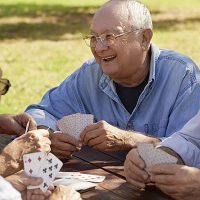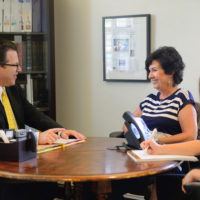Probate, Estate & Trust Administration

Upon a person’s death, family members or others interested in the estate usually locate the will, if there is one, and contact an attorney to represent the estate. The estate’s attorney will arrange for the probate of the will or for qualifying an appropriate person to assume responsibility for administering the estate if there is no will. The attorney will prepare the necessary court papers for filing with the probate court and will represent the personal representative throughout the court proceeding and thereafter in the administration of the estate.
The probate estate consists of personal property (tangible or intangible) owned by the decedent wherever located, and real property owned by the decedent in Florida, except homestead. Bear in mind, however, that real property owned by the decedent in Florida is not homestead until the court enters an order determining that the property is indeed homestead.
Non probate assets pass outside of the decedent’s probate estate and are not subject to court supervision of distribution.
Property not included in the probate estate includes life insurance proceeds that are not made payable to the decedent’s estate, jointly owned property which automatically passes to the surviving joint owner by right of survivorship, and property held by a husband and wife as estates by the entireties. Also, non probate property can consist of an intervivos trust that the decedent had the power to revoke (either alone or in conjunction with another) at the time of his/her death. See, §689.075, Fla. Stat. However, the trust assets may be used to satisfy the expenses of estate administration and the claims of creditors if the probate property is insufficient. See, §733.707(3), Fla. Stat.
If a person dies leaving a will, he or she is said to have died “testate.” If a person dies without a will, he or she is said to have died “intestate.”
In the case of a person who dies having executed a will, a court proceeding is started and the execution of the decedent’s will is proved and an appropriate person (who usually is named/designated in the will) is appointed by the Court to serve as the “personal representative” to administer the estate.
When a person dies intestate (without a will), a petition for administration of the estate is filed, and the probate court appoints a qualified person to serve as the “personal representative” to administer the estate. Preferences in appointment of the personal representative are governed by §733.301(1)(b), Fla. Stat. §§732.101 – 732.111, Fla. Stat., sets forth those who are entitled to inherit in an intestate proceeding.
The personal representative is responsible for assuming control over all of the property owned by the decedent for the purpose of administering the estate. See, §733.608, Fla. Stat.
A Trust Agreement is merely a contract between the Settlor (maker of the trust) and Trustees. It creates an imaginary person (trust) to hold and own assets contributed to it by the Settlor. Generally speaking, the purpose of the trust, the duties to use and distribute trust assets, and the persons to be benefited thereby are stated in the Agreement. Your first job as a Trustee is to read and understand the trust agreement. A “living” trust merely is one made to take effect and be used during the lifetime of the Settlor. In most cases, it will be “revocable” so that the Settlor may change or cancel the trust provisions by amendment. In a few cases, a trust may be “irrevocable” so that it cannot be changed or canceled, except in various circumstances. Article II, Section B of our forms will show the revocability or irrevocability of the Agreement.
There are many reasons for someone to create a trust and a trust is one of the prime estate planning tools used by attorneys to meet the needs and wishes of clientele. Not all of the reasons listed below may be the cause for your Settlor to create the trust you administer.
The main reason for any living trust is to build support mechanisms, in advance of need, so that someone can step-in and handle financial affairs of the initial beneficiary (usually the Settlor) if the initial beneficiary cannot do so himself or herself. A person (a Trustee) esteemed by the Settlor is picked to handle affairs so that, in most cases, should the Settlor become incompetent, there would be no need for a court to appoint a guardian. Every person, someday, for a short or long period, will need that support mechanism and the trust provides that with built-in security measures to protect the initial beneficiary (the Settlor in most cases). However, a Trustee should not act or do transactions when the Settlor (initial beneficiary) can do so himself or herself, unless the Settlor tells the Trustee to do so.
A trust is also used to avoid probate. The Trustees have immediate access to the assets after the death of the initial beneficiary and can then hold, manage, invest, apply, or distribute assets as set forth in the Agreement. Thus, there is no need for probate court proceedings as to all assets placed in the trust ownership, except in relatively rare circumstances. Saving probate saves the estate and the heirs money, time, red-tape, and aggravation.
This law firm stands ready to guide you or assist you in any way. Often, a trustee will ask this firm to handle trust administration, especially after the death of the initial beneficiary, and we can do so for a fee as your agent. In any event, we want to make sure you are comfortable with your duties and that the needs and wishes of the Settlor, our client, is obeyed and honored. Should you have any questions, you should contact us for guidance or assistance. There are no silly questions, but only silly people who do not ask questions.
We Can Help.
Our experienced Probate, Estate & Trust Lawyers can help you navigate the complex issues involving probate and trust administration. Contact us today by calling our Delray Beach, FL office at (561) 733-4242 or click the “book a consultation” box below to schedule a time.







 Attorney Scott Solkoff has worked together with the Florida Department of Elder Affairs on three significant projects designed to benefit Florida’s seniors. The first was the development of the Florida Guardianship Education Coalition which Mr. Solkoff co-chaired with the late Honorable Thomas E. Penick, Jr. The second was the development of a pooled special needs trust managed by a legislatively-created direct service organization. The trust is the first of its kind to provide legislatively-authorized protection for assets of persons with disabilities while also providing funding for indigent people who require otherwise cost-prohibitive guardianship. The third project is the housing of SHINE volunteers in the offices of Solkoff Legal, P.A.
Attorney Scott Solkoff has worked together with the Florida Department of Elder Affairs on three significant projects designed to benefit Florida’s seniors. The first was the development of the Florida Guardianship Education Coalition which Mr. Solkoff co-chaired with the late Honorable Thomas E. Penick, Jr. The second was the development of a pooled special needs trust managed by a legislatively-created direct service organization. The trust is the first of its kind to provide legislatively-authorized protection for assets of persons with disabilities while also providing funding for indigent people who require otherwise cost-prohibitive guardianship. The third project is the housing of SHINE volunteers in the offices of Solkoff Legal, P.A. Solkoff Legal, P.A. was selected as a counseling site where seniors can meet with trained volunteers who provide consumer guidance on Medicare and other insurance choices. Solkoff Legal, P.A. provides complimentary space and support services for the Florida Department of Elder Affairs SHINE program. For more information on the SHINE program or to set an appointment with a SHINE representative, visit the SHINE website. The fact that the SHINE program meets in the law offices of Solkoff Legal, P.A. does not imply any legal advice or endorsement by Solkoff Legal, P.A. of advice provided by SHINE representatives and nor does this program infer any endorsement of Solkoff Legal, P.A. by the SHINE program or the Florida Department of Elder Affairs. This program is part of the charitable mission of Solkoff Legal, P.A.
Solkoff Legal, P.A. was selected as a counseling site where seniors can meet with trained volunteers who provide consumer guidance on Medicare and other insurance choices. Solkoff Legal, P.A. provides complimentary space and support services for the Florida Department of Elder Affairs SHINE program. For more information on the SHINE program or to set an appointment with a SHINE representative, visit the SHINE website. The fact that the SHINE program meets in the law offices of Solkoff Legal, P.A. does not imply any legal advice or endorsement by Solkoff Legal, P.A. of advice provided by SHINE representatives and nor does this program infer any endorsement of Solkoff Legal, P.A. by the SHINE program or the Florida Department of Elder Affairs. This program is part of the charitable mission of Solkoff Legal, P.A.



